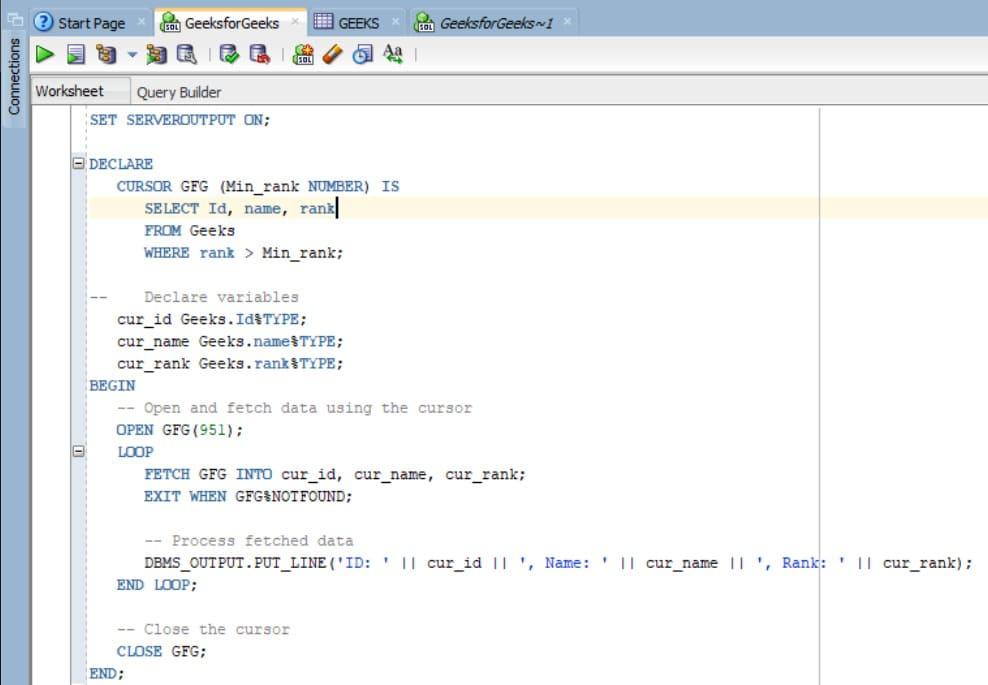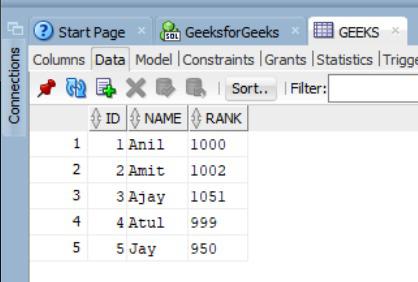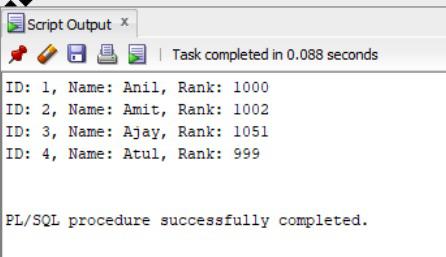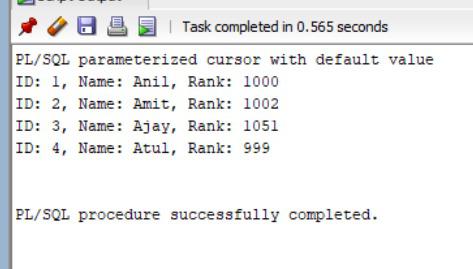
|
|
PL/SQL stands for Procedural Language/ Structured Query Language. It has block structure programming features. With PL/SQL, you can fetch data from the table, add data to the table, make decisions, perform repetitive tasks, and handle errors.PL/SQL supports SQL queries. PL/SQL contains declaration block, begin block, exception block, and end block. Declare and exception blocks are optional. In this article, we will explore PL/SQL Cursors and their parameters, providing insights into the declaration of explicit cursors and the step-by-step process involved. The focus will then shift to the dynamic capabilities of PL/SQL Cursors with Parameters, demonstrating how to create adaptable SQL queries. PL/SQL CursorOracle uses a special memory space called a context area for storing and retrieving information. The context area contains all the details related to the database. The cursor is the virtual pointer to the context area, in the database. The cursor helps you to process through the rows one by one. There are two types of cursors Implicit cursor and Explicit cursor.
Declaration of Explicit Cursor
CURSOR is used to declare the cursor name like a function is used in JavaScript to declare a function.
PL/SQL Cursors with ParametersThe cursor can be declared with the parameter or without the parameter. It can have any number of parameters as per requirement.Cursors with Parameters are used to work with particular data. Parameters are used to create reusable and adaptable code. Explicit cursors may be declared with parameters. The parameter contains a variable and its datatype. The parameter can have a default value associated with a variable. Syntax:
Example of PL/SQL Cursors with ParametersGFG cursor is initialized with a parameter to retrieve the Id, name, and rank of Geek from the Geeks Table. The requested data must satisfy the specified condition.
Output:  Cursor with Parameter Table:Establishing a table named Geeks and adding data to it.  Table Output: Output Explanation: SET SERVEROUTPUT ON is used to display output from DBMS_OPTPUT.PUT_LINE. GFG cursor and variables are declared in the declaration block. The parameter indicates the minimum required rank. The BEGIN keyword is used to start the execution of code. The cursor is opened using the OPEN keyword and data is fetched repeatedly from the table using the LOOP keyword. Data from the table is checked against the condition mentioned in the cursor.DBMS_OUTPUT.PUT_LINE to display the data that satisfies the condition. END LOOP breaks the loop and the cursor is closed using the CLOSE keyword. The END keyword is used to end the execution. PL/SQL Parameterized Cursor with Default ValueDefault values can be passed in the parameterized cursor. If default values are passed in the parameterized cursor in the DECLARE block, the cursor can be called without argument in the BEGIN block if default values are to be used. If arguments are mentioned then they overwrite the default value. Syntax
Example of PL/SQL Parameterized Cursor with Default ValueGFG cursor is initialized with a default value for the parameter to retrieve the Id, name, and rank of Geek from the Geeks Table. The requested data must satisfy the specified condition mentioned in the cursor.
Explanation: The example mentioned is the same as the one used earlier. In this example, default values are used in the parameterized cursor. In DECLARE block cursor is defined with default value for the parameter . The cursor is called without argument in the BEGIN section. Output of Parameterized Cursor with Default Value:  Output of Parameterized Cursor with default value ConclusionIn conclusion, parameterized PL/SQL cursors offer a strong way to improve the adaptability and reuse of database operations. Developers can create dynamic and flexible SQL queries that facilitate efficient data retrieval and manipulation by utilizing parameters inside cursors. This feature is especially useful when working with different conditions or when different sets of data require the application of the same cursor logic. |
Reffered: https://www.geeksforgeeks.org
| Databases |
| Related |
|---|
| |
| |
| |
| |
| |
Type: | Geek |
Category: | Coding |
Sub Category: | Tutorial |
Uploaded by: | Admin |
Views: | 12 |